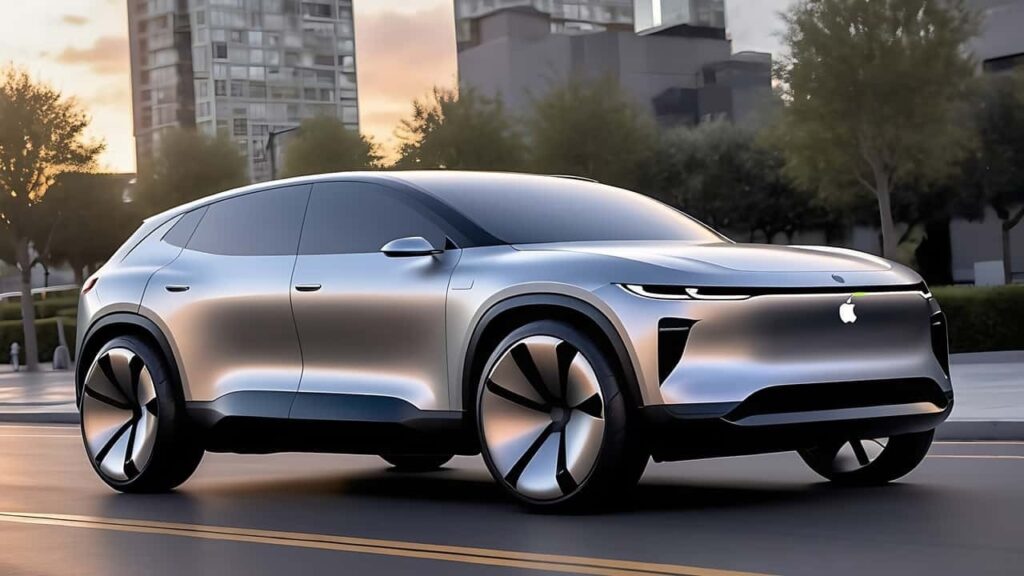The intersection of technology and automotive innovation has long been a captivating realm, and one company that continually fuels this fascination is Apple. Renowned for its groundbreaking advancements in the realm of smartphones, Apple has recently set its sights on revolutionizing yet another industry: electric vehicles (EVs).

Unraveling the Buzz Around Apple's Electric Car
The buzz surrounding Apple’s venture into electric cars has ignited a palpable excitement, surpassing even the fervor typically associated with its flagship product releases. Speculation and anticipation have reached a fever pitch as enthusiasts eagerly await the unveiling of Apple’s electric vehicle.
In recent updates, Apple has tantalized the public with glimpses into its EV project, internally known as Project Titan. From showcasing conceptual designs like the ‘Model B’ to strategic acquisitions such as Drive.Ai, a company specializing in autonomous driving technology, Apple has signaled its serious intent to enter the automotive market.
A Series of Twists and Turns for Apple
However, amidst the anticipation, unexpected developments have emerged, injecting a sense of uncertainty into the narrative. Insider reports suggest that Apple may have halted its EV initiative, leaving many to ponder the reasons behind this apparent pivot.
The silence from Apple’s top executives, including CEO Jeff Williams and Vice President Kevin Lynch, has only fueled speculation further, with industry observers questioning the company’s strategic direction. This ambiguity surrounding the fate of Project Titan underscores the complexities and challenges inherent in the automotive industry, even for a tech giant like Apple.
The Competitive Landscape
Apple’s potential withdrawal from the electric car race reflects the intense competition within the automotive sector. Established players like Tesla, with its innovative approach to EVs, and emerging contenders like PYD, are reshaping the industry landscape.
Moreover, traditional automakers such as Toyota, Mercedes-Benz, BMW, and Audi are ramping up their efforts in electrification, signaling a seismic shift towards sustainable mobility. In this fiercely competitive environment, Apple’s decision to potentially shift focus raises questions about its future role in shaping the future of transportation.

A Roller Coaster Ride of Innovation
Since its inception in 2014, Project Titan has been a roller coaster ride of innovation and speculation. The allure of autonomous driving and the prospect of an Apple-branded electric car captured the imagination of consumers worldwide. However, the recent indications of Project Titan’s discontinuation have cast a shadow over these lofty ambitions.
Apple’s brand, synonymous with innovation and premium quality, had the potential to disrupt the automotive industry much like it did with smartphones. The promise of an Apple electric car represented a convergence of cutting-edge technology and automotive excellence, with the potential to redefine the driving experience.
The Future of Mobility
While the fate of Apple’s electric car remains uncertain, its foray into the automotive industry highlights the relentless pursuit of innovation and evolution. Whether Apple ultimately decides to proceed with its EV project or pivot towards other ventures, its exploration of the automotive sector underscores the dynamic nature of technology and mobility.
As the world awaits further developments from Apple, the legacy of Project Titan will endure, serving as a testament to the company’s unwavering commitment to pushing the boundaries of possibility.

FAQs
- What is Apple’s Project Titan? Project Titan is Apple’s secretive initiative aimed at developing an electric vehicle (EV). First rumored in 2014, Project Titan has undergone various stages of development, with Apple exploring the possibility of entering the automotive market.
- Why is Apple interested in making an electric car? Apple’s interest in electric cars aligns with its broader strategy of diversifying its product portfolio and exploring new revenue streams. Additionally, the shift towards electric vehicles reflects a global trend towards sustainable transportation, presenting opportunities for innovation and market disruption.
- What challenges has Apple faced in developing its electric car? Developing an electric car poses numerous challenges, including regulatory hurdles, technological complexities, and intense competition from established automakers and emerging players. Apple’s secretive approach to Project Titan has also fueled speculation and uncertainty among industry observers.
- Has Apple officially confirmed its plans for an electric car? Despite widespread speculation and occasional hints from company executives, Apple has yet to officially confirm its plans for an electric car. The lack of concrete announcements has led to conjecture and debate within the automotive and tech communities regarding the extent of Apple’s involvement in the EV space.
- What impact could Apple’s entry have on the automotive industry? Apple’s potential entry into the electric car market could have significant implications for the automotive industry. If successful, Apple’s electric car could disrupt traditional automakers, accelerate the adoption of electric vehicles, and reshape consumer perceptions of mobility and technology.
Leave a Reply